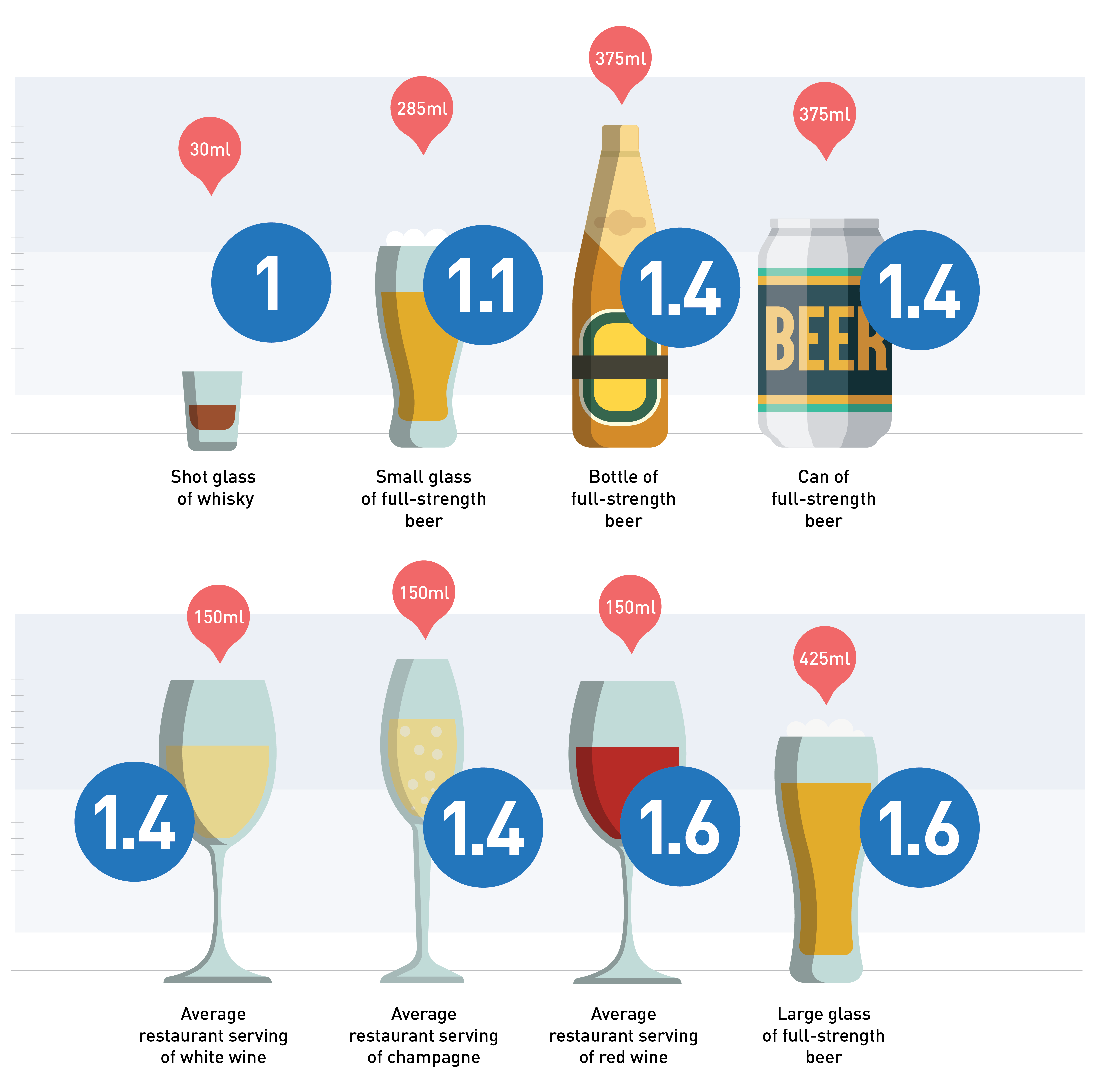There’s a lot of talk about alcohol and what it does to people’s health.
Drinking alcohol is a big part of the Australian culture and is often linked with many social activities. You won’t just find alcoholic drinks at parties or bars, it may be available at sporting events, concerts, university functions, work events or casual gatherings.
A report by the Australian government found most Australians aged 14 years and over consume alcohol, and the average household spends $32 per week on alcoholic drinks.
Because alcoholic drinks are so common in Australia, it’s good to know the facts, because no matter how much you drink, there are risks. These are considerable if you drink heavily every day or a lot in one day or evening (also known as bingeing), but even small amounts of alcohol are connected to the development of certain diseases, including several cancers, and can impact mental health.
Alcohol may also impact your ability to work, study, sleep, and manage your money. It may also affect your personal relationships.
What is a standard drink?
Before we start, it’s important to understand what equals one standard drink.
Standard drinks are a way to measure how much alcohol you drink; a standard drink equals 10 grams of pure alcohol.
Drinks come in different sizes, so they have different amounts of alcohol in them. Bottled drinks will have the number of standard drinks on the label. Bars and clubs in Australia are required by law to serve drinks in sizes so it’s easier to calculate the number of standard drinks.

The new Australian Guidelines recommend drinking no more than 4 standard drinks a day and a maximum of 10 standard drinks per week, to reduce your risk of harm from alcohol.
Alcohol: True or false?
People have all kinds of ideas about alcohol – some of them not true. Here’s how to separate fact from fiction.
True or false: It’s too hard to say no if someone offers me alcohol.
FALSE. It’s okay to say ‘no’ to an alcoholic drink. You should never feel pressured to drink alcohol.
Practise how to respond to people because it may be helpful if you find yourself in that situation. Say, “I’m pacing myself”, “I’m on a health kick”, “I’m trying to cut back” or “I don’t drink alcohol”.
Do you have friends who don’t want to drink alcohol or limit how much they drink? Invite them to social outings so you can help each other say ‘no’ to alcohol.
If you don’t feel safe, have an escape plan or a friend you can call for support.
But always remember: it’s okay to say ‘no’.
True or false: All drinking laws in Australia are the same no matter where you are.
FALSE. In Australia, most of the laws are the same in each state or territory but the big ones are:
1. You must be aged 18 years or over to buy alcohol.
2. Regardless of whether you hold an Australian or overseas driving licence, the amount of alcohol measured in your blood when driving must be less than 0.05. If you’re on a provisional/probationary or learner licence (also known as “P plates” or “L plates”), or its overseas equivalent, it must be 0.
It’s good to be aware of the alcohol laws in each state or territory during your time in Australia.
True or false: Having a night out and watching how much you drink is hard to do.
FALSE. There are ways you can moderate your alcohol intake. You can drink water in-between alcoholic drinks, stay away from drinking shots of alcohol or buying ‘rounds’ of drinks for others, or keep track of how much money you’re spending. Making sure you have eaten and are not drinking on an empty stomach is also a good tip.
True or false: Having a cold shower after drinking will help sober you up.
FALSE. Alcohol gets metabolised slowly, so there’s no quick fix when it comes to sobering up. Once alcohol is in your body it must be processed by the liver, and the liver takes time to work. Everyone is different and metabolises alcohol differently, some slower than others, so there’s no “magic number” of time you have to wait to be sober.
True or false: Alcohol isn’t as harmful as other drugs.
FALSE. Alcohol can damage parts of the body such as the liver, and increases your risk of deadly diseases, including cancer. Drinking too much alcohol too quickly can lead to alcohol poisoning, which can kill you. If that isn’t enough warning, alcohol can contribute to risky behaviours, injuries to yourself and others, and losing friendships, family or employment because of your behaviour when you drink alcohol.
True or false: Binge drinking isn’t a problem for people who can hold their alcohol.
FALSE. Binge drinking is bad. Binge drinking Alcohol can have an impact on your health even if you do not drink very often. Any more than four standard drinks in a single session will put your health at risk.
More benefits
Cutting back on alcohol isn’t just about avoiding the risks: it’s also about making things better physically, mentally, and socially.
Here are some other benefits to cutting back:
- Weight reduction
- Better concentration
- Increase in energy
- Improvement in mood and sleep
- Better relationships with loved ones
- More money in the bank
Why not try a mocktail? Mocktails have no alcohol. Read our article with five of our favourite mocktail recipes.
Stay safe when drinking alcohol
Remember to set yourself a limit on how much you drink before you go out and try to stick to your plan. Stick to a budget of how much you can afford to spend on alcohol and avoid buying rounds of drinks, which may be expensive. Here’s some more tips to stay safe:
- Do activities where drinking only plays a minor role, like going to a movie or playing an outdoor game.
- Focus on enjoying other aspects of going out, like the conversation or experiencing something new.
- Drink a glass of water or non-alcoholic drink in-between alcoholic drinks.
- Have a meal when you drink alcohol; it can help slow the effects of alcohol.
- Stay away from shots; they encourage binge drinking.
- Say no if you don’t want to drink any more alcohol. Your friends should respect your decision.
- Find a friend and agree to look out for each other when you’re drinking.
- Take condoms in your wallet or bag if there’s a chance you may have sex.
- Try not to mix alcohol with other drugs, as you may not know how they may affect you.
Online Doctor
OSHC policy holders can have a telehealth consultation with a GP using the Online Doctor function on the Medibank or ahm OSHC app. Online consultations are available 24/7 when you need to speak to a GP late at night or if you’re isolating at home. Whether it’s for general health advice, access to prescriptions, a referral, obtaining medical certificates or arranging local pharmacy pick-ups, a doctor is now a thumb tap away. Online Doctor will send us the bill directly. A minimum out-of-pocket expense of $10 applies.*
Call the Student Health Support Line on 1800 887 283.
For crisis calls please contact Lifeline on 13 11 14 or 000 in the case of an emergency.

